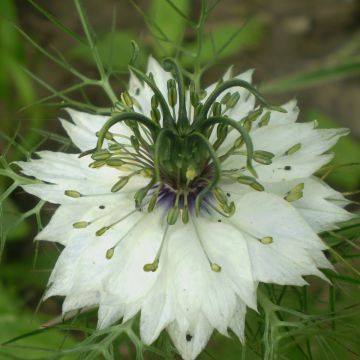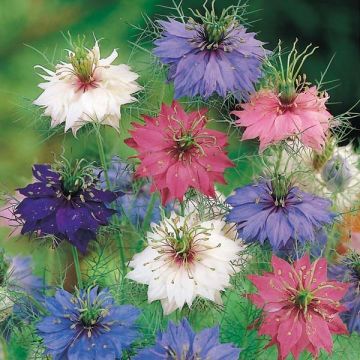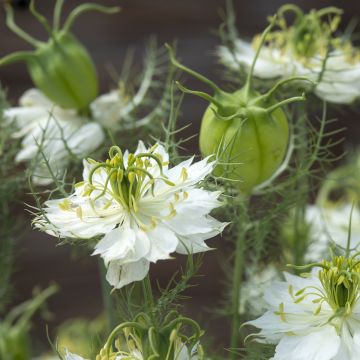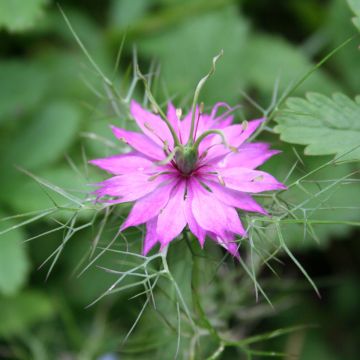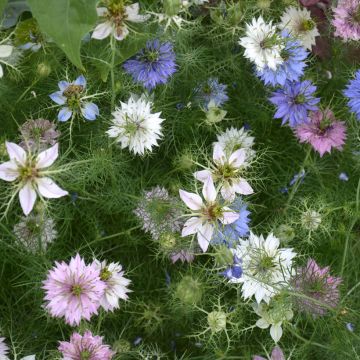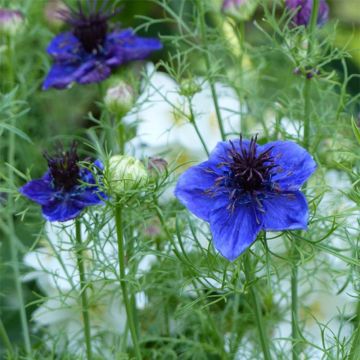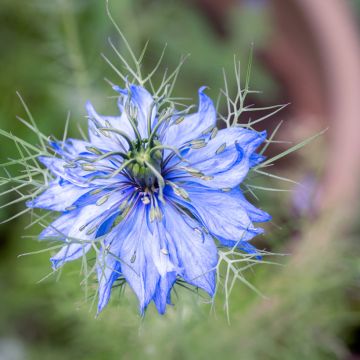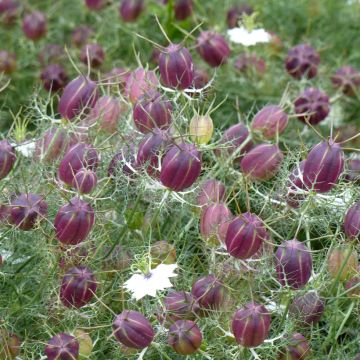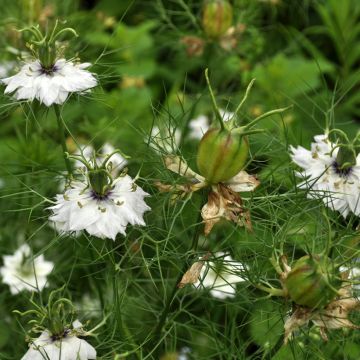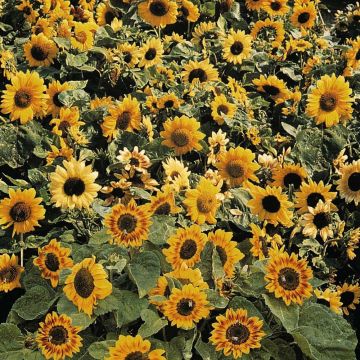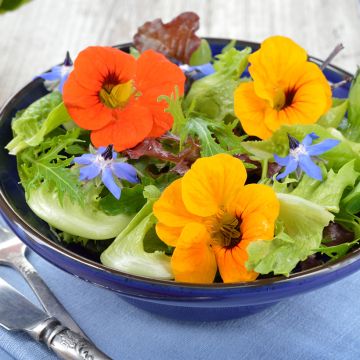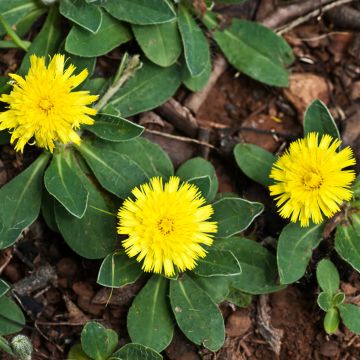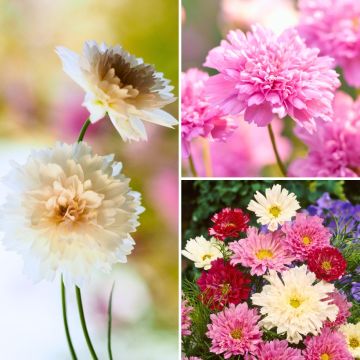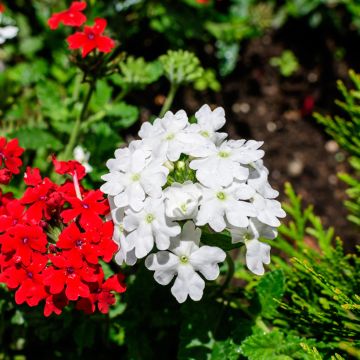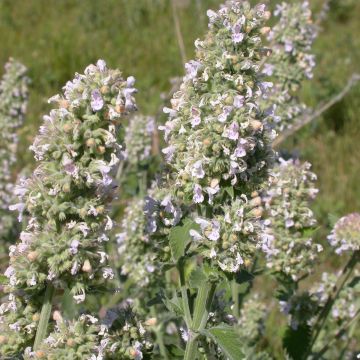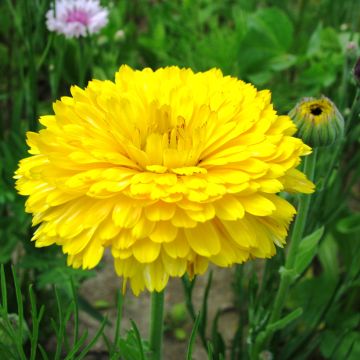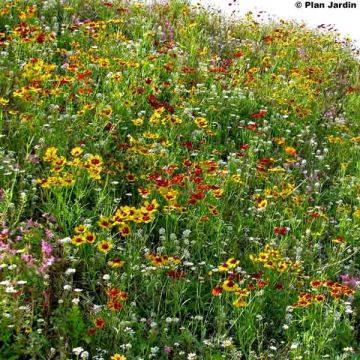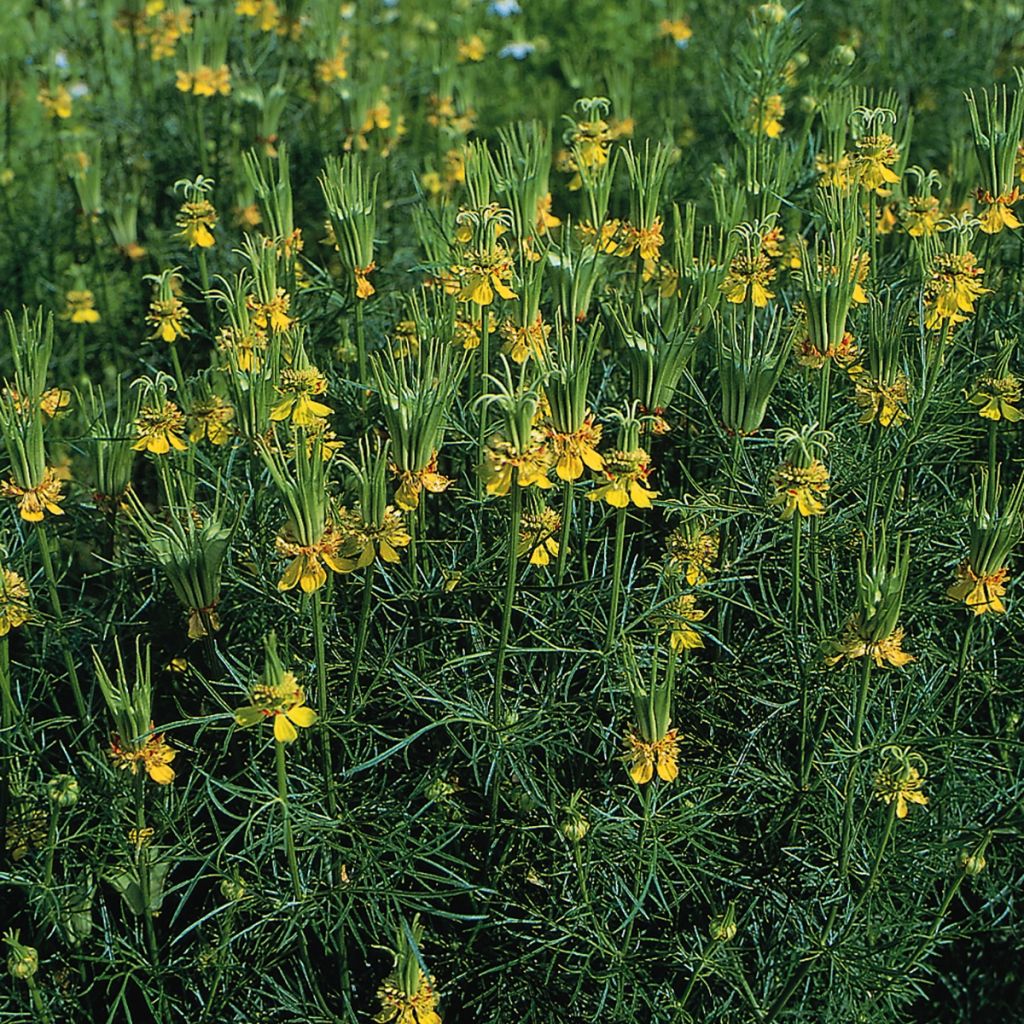

Graines de nigelle d'Orient Transformer - Nigella orientalis
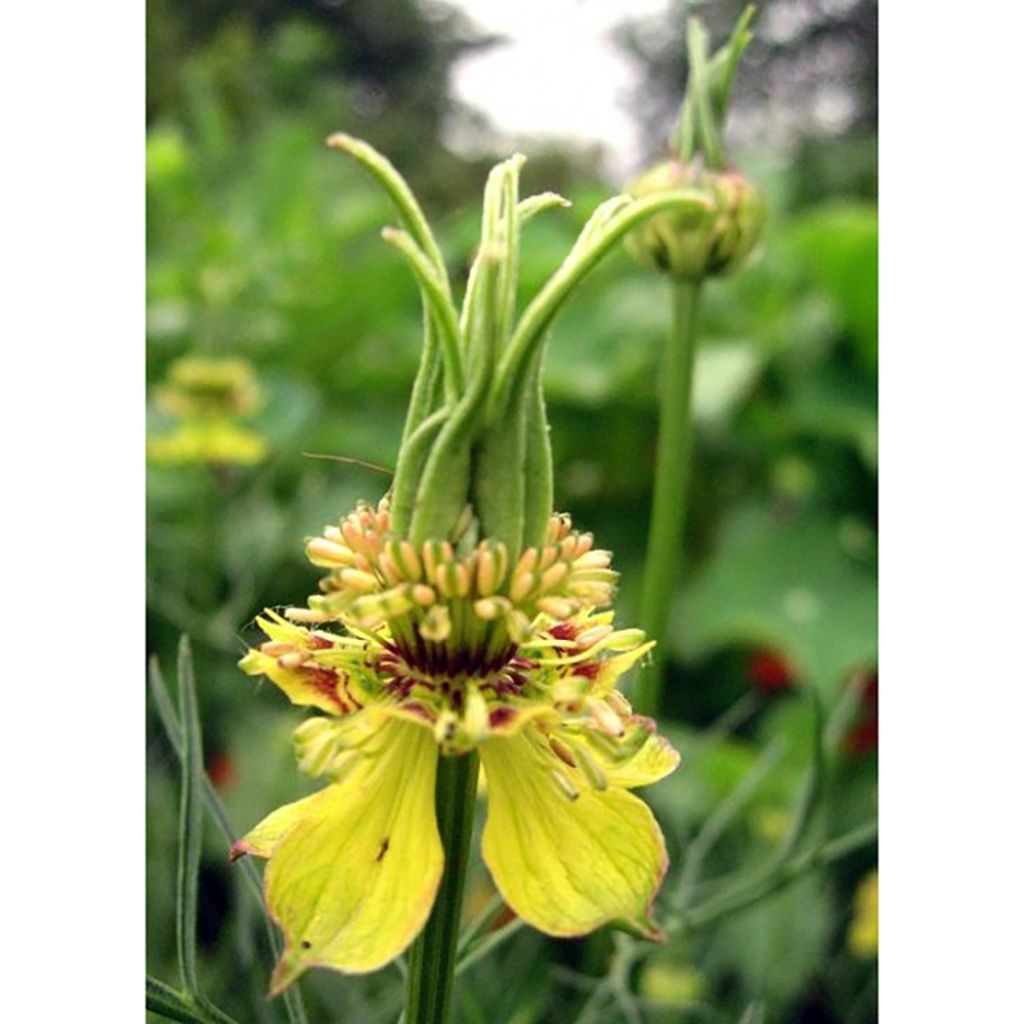

Graines de nigelle d'Orient Transformer - Nigella orientalis
Nigella orientalis 'Transformer'
Nigella orientalis Tranformer
Yellow Fennel Flower
This item cannot be shipped to the selected country
Dispatch by letter from €3.90
More information
Schedule delivery date,
and select date in basket
This plant carries a 6 months recovery warranty
More information
We guarantee the quality of our plants for a full growing cycle, and will replace at our expense any plant that fails to recover under normal climatic and planting conditions.
Seed-only orders are dispatched by sealed envelope. The delivery charge for seed-only orders is €3.90.
Does this plant fit my garden?
Set up your Plantfit profile →
Description
This other nigella, called Nigella orientalis 'Transformer', is very different from its cousin, the Damascus nigella. This annual plant has flowers with almost invisible red marbled petals and developed and decorative yellow sepals arranged in a corolla around a crown of central stamens. The flowers transform into very unique green fruits, resembling jester caps. You can sow this plant directly in rockeries or sunny flower beds, in well-drained soil, without worrying about disturbing neighbouring plants. The flowers of this 'Transformer' nigella are very beautiful in fresh or dried bouquets.
Much less known than the Damascus nigella, the oriental nigella is native to Western Asia. It is a hardy annual plant from the Ranunculaceae family. The 'Transformer' variety is an improved form of this botanical species, which has retained its originality. This nigella forms a small tuft of ramified stems 40 to 50cm (16 to 20in) tall when in bloom, and even 60cm (24in) in rich soil, with a diameter of 30cm (12in). Its delicate foliage resembles that of fennel. The linear lanceolate basal leaves measure 2 to 4mm (0in) in length, and the cauline leaves are palmately cut and strongly dissected, composed of very fine linear segments. The flowers with yellow sepals and atrophied petals are solitary, 3 to 5cm (1 to 2in) wide, carried by thin but sturdy stems. The flowering period depends on the sowing date. Spring sowings bloom from July to September, while sowings in September-October bloom as early as May-June. Nigella flowers are very melliferous and nectariferous. The flowers are followed by the formation of curious and decorative small fruits: they are long, ribbed, slightly twisted, and fused at the base capsules. The capsules dry out and then release black seeds that self-sow and germinate spontaneously in light soils.
The 'Transformer' oriental nigella is a rare plant, but nevertheless easy to grow in well-drained soils. It is perfect everywhere: in natural gardens, rockeries, perennial flower beds where it lightens the blooms. It pairs well with bush roses. It fills empty spaces in record time and allows for the quick creation of a colourful countryside decor with Phacelias, sainfoin, Californian poppies, perennial flax, or wild chicory. The 'Transformer' nigella allows for the creation of refined, contemporary, or naturalistic bouquets.
Report an error about the product description
Flowering
Foliage
Plant habit
Botanical data
Nigella
orientalis
Tranformer
Ranunculaceae
Yellow Fennel Flower
Cultivar or hybrid
Other Nigella -Love-in-a-mist seeds
Planting and care
Sowing of the Oriental Nigella 'Transformer' is a piece of cake. Sow the seeds outdoors, directly in the open ground, in spring (from late March to late May) in our regions that are a bit cold in winter, or in late summer (September-October) in mild climates.
Prepare the soil well to loosen and lighten it before sowing. Sow in rows spaced 30cm (12in) apart, at a depth of 6mm (0in). Young plants do not appreciate being disturbed at all. You can create beautiful flower pots for spring by sowing the seeds in a cold greenhouse or in a conservatory in late summer and autumn. Thin out the sowing to leave only one plant every 30cm (12in).
Nigellas love the sun and tolerate drought well, as they adapt their life cycle to climatic conditions: they germinate in autumn and flower early in regions with dry summers, but germinate in spring to bloom all summer in cooler climates. These plants self-seed very easily in the garden, but not always reliably.
Limestone soils are very well tolerated.
Sowing period
Intended location
-
, onOrder confirmed
Reply from on Promesse de fleurs
Flower seeds
Haven't found what you were looking for?
Hardiness is the lowest winter temperature a plant can endure without suffering serious damage or even dying. However, hardiness is affected by location (a sheltered area, such as a patio), protection (winter cover) and soil type (hardiness is improved by well-drained soil).

Photo Sharing Terms & Conditions
In order to encourage gardeners to interact and share their experiences, Promesse de fleurs offers various media enabling content to be uploaded onto its Site - in particular via the ‘Photo sharing’ module.
The User agrees to refrain from:
- Posting any content that is illegal, prejudicial, insulting, racist, inciteful to hatred, revisionist, contrary to public decency, that infringes on privacy or on the privacy rights of third parties, in particular the publicity rights of persons and goods, intellectual property rights, or the right to privacy.
- Submitting content on behalf of a third party;
- Impersonate the identity of a third party and/or publish any personal information about a third party;
In general, the User undertakes to refrain from any unethical behaviour.
All Content (in particular text, comments, files, images, photos, videos, creative works, etc.), which may be subject to property or intellectual property rights, image or other private rights, shall remain the property of the User, subject to the limited rights granted by the terms of the licence granted by Promesse de fleurs as stated below. Users are at liberty to publish or not to publish such Content on the Site, notably via the ‘Photo Sharing’ facility, and accept that this Content shall be made public and freely accessible, notably on the Internet.
Users further acknowledge, undertake to have ,and guarantee that they hold all necessary rights and permissions to publish such material on the Site, in particular with regard to the legislation in force pertaining to any privacy, property, intellectual property, image, or contractual rights, or rights of any other nature. By publishing such Content on the Site, Users acknowledge accepting full liability as publishers of the Content within the meaning of the law, and grant Promesse de fleurs, free of charge, an inclusive, worldwide licence for the said Content for the entire duration of its publication, including all reproduction, representation, up/downloading, displaying, performing, transmission, and storage rights.
Users also grant permission for their name to be linked to the Content and accept that this link may not always be made available.
By engaging in posting material, Users consent to their Content becoming automatically accessible on the Internet, in particular on other sites and/or blogs and/or web pages of the Promesse de fleurs site, including in particular social pages and the Promesse de fleurs catalogue.
Users may secure the removal of entrusted content free of charge by issuing a simple request via our contact form.
The flowering period indicated on our website applies to countries and regions located in USDA zone 8 (France, the United Kingdom, Ireland, the Netherlands, etc.)
It will vary according to where you live:
- In zones 9 to 10 (Italy, Spain, Greece, etc.), flowering will occur about 2 to 4 weeks earlier.
- In zones 6 to 7 (Germany, Poland, Slovenia, and lower mountainous regions), flowering will be delayed by 2 to 3 weeks.
- In zone 5 (Central Europe, Scandinavia), blooming will be delayed by 3 to 5 weeks.
In temperate climates, pruning of spring-flowering shrubs (forsythia, spireas, etc.) should be done just after flowering.
Pruning of summer-flowering shrubs (Indian Lilac, Perovskia, etc.) can be done in winter or spring.
In cold regions as well as with frost-sensitive plants, avoid pruning too early when severe frosts may still occur.
The planting period indicated on our website applies to countries and regions located in USDA zone 8 (France, United Kingdom, Ireland, Netherlands).
It will vary according to where you live:
- In Mediterranean zones (Marseille, Madrid, Milan, etc.), autumn and winter are the best planting periods.
- In continental zones (Strasbourg, Munich, Vienna, etc.), delay planting by 2 to 3 weeks in spring and bring it forward by 2 to 4 weeks in autumn.
- In mountainous regions (the Alps, Pyrenees, Carpathians, etc.), it is best to plant in late spring (May-June) or late summer (August-September).
The harvesting period indicated on our website applies to countries and regions in USDA zone 8 (France, England, Ireland, the Netherlands).
In colder areas (Scandinavia, Poland, Austria...) fruit and vegetable harvests are likely to be delayed by 3-4 weeks.
In warmer areas (Italy, Spain, Greece, etc.), harvesting will probably take place earlier, depending on weather conditions.
The sowing periods indicated on our website apply to countries and regions within USDA Zone 8 (France, UK, Ireland, Netherlands).
In colder areas (Scandinavia, Poland, Austria...), delay any outdoor sowing by 3-4 weeks, or sow under glass.
In warmer climes (Italy, Spain, Greece, etc.), bring outdoor sowing forward by a few weeks.

































